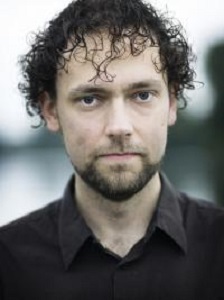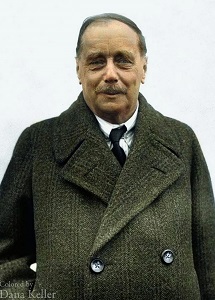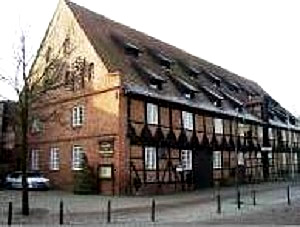|
De Vlaamse dichter Xavier Roelens werd op 21 september 1976 in Rekkem (Menen). Zie ook alle tags voor Xavier Roelens op dit blog.
Huishouden
we spreken de stoel af, het venster,
daarbuiten de put. hier het laken
en daaronder het naakte slopende meisje
midden de muur hangt gekaderd
het toeziend oog; camera's doen hun werk
en zonder hieraan afbreuk: een stoel wordt
geen stol, houdt huis. zo ook het raamkozijn,
het tekort van de put. het haar dat haar bewaakt
de slaap sloopt niet meer droomt onafgesproken.
het venster graaft zich in het uitzicht in - eerlijk is eerlijk.
Besluit
Zo vaak als nodig is, zeg ik nee.
Zeg ik nee.
Nee.
Het besluit is gevallen,
het valt, het blijft vallen,
en gelijk het valt, zo val ik.
Wij vallen diep, mijn besluit en ik,
maar wij vallen samen.
Wij zoeken het ravijn,
en van klimmen
is voorlopig geen sprake.
Op de bodem van het ravijn
groeien wonderlijke
bloedbloemen.

Xavier Roelens (Rekkem, 21 september 1976)
De Amerikaanse schrijfster en actrice Fannie Flagg (eig. Patricia Neal) werd geboren op 21 september in Birmingham (Alabama). Zie ook mijn blog van 21 september 2010 en evenneens alle tags voor Fannie Flagg op dit blog.
Uit:The All-Girl Filling Station's Last Reunion
“Mrs. Earle Poole, Jr., better known to friends and family as Sookie, was driving home from the Birds-R-Us store out on Highway 98 with one 10-pound bag of sunflower seeds and one 10-pound bag of wild bird seed and not her usual weekly purchase for the past fifteen years of one 20-pound bag of the Pretty Boy Wild Bird Seed & Sunflower Mix. But as she had explained to Mr. Nadleshaft, she was worried that the smaller birds were still not getting enough to eat. Every morning lately, the minute she filled her feeders, the larger more aggressive blue jays would swoop in and scare the little birds all away. She noticed that the blue jays always ate the sunflower seeds first, and so tomorrow, she was going to try putting just plain sunflower seeds in her front yard feeders, and while the blue jays were busy eating them, she would run around the house as fast as she could and put the plain wild bird seed in the feeders in the back yard. That way, her poor finches and titmouses might be able to get a little something, at least. *** As she drove over the Mobile Bay Bridge, she looked out at the big white puffy clouds and saw a long row of pelicans flying low over the water. The bay was sparkling in the bright sun and already dotted with red, white, and blue sailboats headed out for the day. A few people standing alongside the bridge fishing waved as she passed by, and she smiled and waved back. She was almost to the other side when she suddenly began to experience some sort of a vague and unusual sense of wellbeing. And with good reason. Against all odds, she had just survived the last wedding of their three daughters, Dee Dee and the twins, Ce Ce and Le Le. Their only unmarried child now was their 25-year-old son, Carter, who lived in Atlanta. And some other poor (God help her), beleaguered Mother of the Bride would be in charge of planning that happy occasion. All she and Earle would have to do for Carter’s wedding was show up and smile. And today, other than one short stop at the bank and picking up a couple of pork chops for dinner, she didn’t have another single thing she had to do. She was almost giddy with relief. Of course, Sookie absolutely worshipped and adored her girls, but having to plan three large weddings in less than two years had been a grueling, never-ending, twenty-four hours a day job, with all the bridal showers, picking out patterns, shopping, fittings, writing invitations, meeting with caterers, figuring out seating arrangements, ordering flowers, etc.”

Fannie Flagg (Birmingham, 21 september 1944)
De Britse schrijver Herbert George Wells werd geboren op 21 september 1866 in Bromley, Kent. Zie ook mijn blog van 21 september 2010 en eveneens alle tags voor H. G. Wells op dit blog.
Uit: The Outline Of History (The Decay of Syria under the Sassanids)
'Syria was broken up into a curious quilt-like pattern of principalities and municipal kingdoms; beginning with the almost barbarous states of Commagene and Edessa (Urfa) in the north. South of these stood Bambyce, with its huge temples and priestly governors. Towards the coast a dense population in villages and towns clustered around the independent cities of Antioch, Apamea, and Emesa (Homs); while out in the wilderness the great Semitic merchant city of Palmyra was gaining wealth and greatness as the neutral trading-ground between Parthia and Rome. Between the Lebanon and Anti-Lebanon we find, at the height of its glory, Heliopolis (Baalbek), the battered fragments of which even now command our admiration. . . . Bending in towards Galilee we find the wondrous cities of Gerasa and Philadelphia (Amman) connected by solid roads of masonry and furnished with gigantic aqueducts. . . . Syria is still so rich in ruins and remains of the period that it is not difficult to picture to oneself the nature of its civilization. The arts of Greece, imported long before, had been developed into magnificence that bordered on vulgarity. The richness of ornamentation, the lavish expense, the flaunting wealth, all tell that the tastes of the voluptuous and artistic Semites were then as now. I have stood in the colonnades of Palmyra and I have dined in the Hotel Cecil, and, save that the latter is built of iron, daubed with sham wood, sham stucco, sham gold, sham velvet, and sham stone, the effect is identical. In Syria there were slaves in sufficient quantity to make real buildings, but the artistic spirit is as debased as anything made by machinery. Over against the cities the village folk must have dwelt pretty much as they do now, in houses of mud and dry stone wall ; while out in the distant pastures the Bedouin tended their flocks in freedom under the rule of the Nabatean kings of their own race, or performed the office of guardians and agents of the great trading caravans.
'Beyond the herdsmen lay the parching deserts, which acted as the impenetrable barrier and defence of the Parthian Empire behind the Euphrates, where stood the great cities of Ctesiphon, Seleucia, Hatra, Nisibin, Harran, and hundreds more whose very names are forgotten. These great townships subsisted on the enormous cereal wealth of Mesopotamia, watered as it then was by canals, whose makers' names were even then already lost in the mists of antiquity.“

H. G. Wells (21 september 1866 - 13 augustus 1946)
Foto uit 1930, ingekleurd door Dana Keller.
De Duitse dichter Johann Peter Eckermann werd geboren op 21 september 1792 in Winsen (Luhe). Hij was bovenal de medewerker en vriend van Johann Wolfgang von Goethe.Zie ook mijn blog van 21 september 2010 en eveneens alle tags voor Johann Peter Eckermann op dit blog.
An... Es sandte der April
Es sandte der April uns herbe Schauer,
Kein grünes Blättchen wagte sich hervor;
Schien ja die Sonne, war's von kurzer Dauer,
Gleich hüllend sich in finstrer Wolken Flor.
Da war's am besten im gesell'gen Zimmer,
Am besten dort, wo man Dich, Holde, sah;
In Deiner Anmut Nähe glaubt' ich immer,
Es sei der Lenz mit allen Freuden da.
Das Dachstübchen
Du wohnst erhaben in des Himmels Nähe,
Und zwar mit mehr als bloßem Schein:
Glaubt' ich doch oft bei dir in solcher Höhe
An reiner Seligkeit ein Gott zu sein! -

Johann Peter Eckermann (21 september 1792 - 3 december 1854)
Museum im Marstall met het Eckermann-Gedenkzimmer in Winsen
21-09-2014 om 11:21
geschreven door Romenu 
Tags:Xavier Roelens, Fannie Flag, H.G. Wells, Johann Peter Eckermann, Romenu
|

